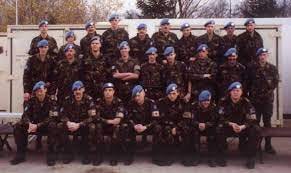It is February 1992.
Bosnia and Herzegovina has become the real epicenter of ethnic tensions in the former Yugoslavia [you can listen to the latest episode of BarBalkans - Podcast here].
Republika Sprska has drawn the borders of the six Serbian autonomous provinces (SAOs), announcing the end of a united Bosnia.
Europe asked Sarajevo to organize a referendum on independence to accept the request for international recognition.
The situation gets worse.
However, the Western world continues not to understand the gravity of the situation and decides not to deploy the new United Nations Protection Force in Bosnia.
A League for Bosnia
Until 1992, Bosnia and Herzegovina was a Socialist Republic composed of three main ethnic groups: Serbs, Croats and Muslims (also known as Bosniaks).
Since October 1991, growing tensions between these groups have resulted in threats of genocide and declarations of secession. The main protagonist is the leader of the Serbs of Bosnia, Radovan Karadžić.
Apparently, two opposing fronts are forming: Serbs of Bosnia against everyone. The truth is that each one is for themselves.
Croats of Bosnia are making their plans to get ready to reunite with the “motherland” in case of conflict in the Republic and are keeping constant contact with the President of Croatia, Franjo Tuđman.
Bosniaks still believe in cooperation with the federal authorities and in the project of a united Bosnia. In the meantime they have to watch their backs.
Even before the outbreak of the Yugoslav Wars, the President of Bosnia, Alija Izetbegović, secretly summoned over 350 representatives of “his” Democratic Action Party (SDA) to Sarajevo in June 1991.
During the meeting it was decided to create a Patriotic League, in charge of preparing for the defense of the Republic, in case of necessity.
In the following seven months the Patriotic League welcomes about 30 thousand members.
When the risk of a real outbreak war occurs - due to the secessionism of Serbs of Bosnia and the occupation of the territory by the JNA - the Patriotic League begins to distribute weapons clandestinely.
A meeting of the provincial commands takes place in the town of Mehuriči (in central Bosnia) to discuss how to deploy forces and to organize armed struggle.
Sefer Halilović, former JNA officer and by now a clear predestined to command the Army of Republic of Bosnia and Herzegovina, reads the report.
On February 25, the official guidance for the defense of the Republic is approved by the central command in Hrasnica, in the outskirts of Sarajevo.
In the meantime, on February 14, the International Conference on Bosnia and Herzegovina is held in the capital. The aim is to seek a peaceful solution on the ground, yet still based on ethnic divisions.
Neither Europe nor the United Nations actually realize how much the situation has slipped out of their hands.
The birth of UNPROFOR
This assumption is evidenced by the fact that, in the meantime, the attention of the Western world is still on the last events of the war in Croatia.
Everything is ready for the arrival of the UN Blue Helmets in the three protected areas (UNPA) in Krajina, Banija and Slavonia.
For Belgrade this is the right time to accept UN soldiers, since all Serbian military operations in 1991 were successful and now it is necessary to defend from Croatian reaction.
However, the President of the Republic of Serbian Krajina, Milan Babić, continues to strongly oppose Slobodan Milošević’ decision to align with General Cyrus Vance’s Plan on the deployment of UN forces.
But the balance of power is not equally distributed and Milošević prevails.
On February 9, the Parliament of Krajina is convened in the town of Glina. Babić boycotts the session that gives the green light to the Blue Helmets’ arrival.
Babić’ trajectory reaches its lowest point on February 26, when he is removed as President of Krajina and downgraded to Foreign Minister.
Goran Hadžić, storekeeper, former councillor and exponent of the Serbian Democratic Party (SDS) in Vukovar, takes his place.
On February 15, the Secretary General of the United Nations, Boutros Boutros-Ghali, officially proposes to the Security Council to send 14 thousand UN soldiers to the Balkans.
Six days later, the 15 Member States vote in formal session in favor of Resolution 743, which provides for the deployment of Blue Helmets, in order to «create the conditions of peace and security necessary to reach a solution to the Yugoslav crisis».
Thus the mission of UNPROFOR - United Nations Protection Force begins.
A mission whose planned duration is one year, with a budget of 250 million dollars (it will be different, increasing up to two billion dollars and 45 thousand soldiers over the years).
Sarajevo is chosen as the headquarters of UNPROFOR, hoping that the Western diplomatic presence would be a deterrent to the escalation of ethnic tensions in Bosnia.
The situation on the ground shows the opposite.
If you liked this article, you can spread this parallel journey and the free weekly newsletter:
If you know someone who can be interested in this newsletter, why not give them a gift subscription?
Here is the archive of BarBalkans - Podcast:
And here the summary of 1991.



















Share this post